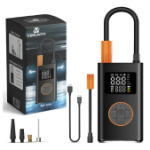If you work with Uber, 99 or any other transportation app, you've probably thought about switching to an electric car, right? With gasoline costing more and more and the maintenance of combustion vehicles rising year after year, many people are looking to electric cars as a smart way to reduce costs and increase their monthly profits.
But that's when a lot of questions arise: is it really worth it? Which model is best for work? How much does it cost to charge the battery? Can it last a whole day on the road?
Don't worry. In this guide, we'll analyze the most affordable models for app drivers, showing advantages, limitations and which one makes the most sense for your routine.
Spoiler: the savings may be greater than you think!
Why Are So Many People Switching to Electric Cars? 🔋
The truth is that the reasons are quite clear. While the average driver spends hundreds of reais a week on gasoline, those who use electric cars pay a fraction of that to travel the same distance.
Imagine exchanging R$ 350 a week in fuel for something like R$ 60 to recharge the battery. That difference has a direct impact on your monthly profit - and for someone who makes a living from their car, that makes all the difference.
What's more, maintenance is much cheaper. Electric cars don't have oil, spark plugs, filters or dozens of components that cause problems in combustion models. This means fewer trips to the garage and less downtime - essential for app drivers.
The Cheapest and Most Advantageous Trams for Uber and 99 💰
We've selected the models that really make sense for those who work with applications. Check them out:
Renault Kwid E-Tech - The Most Economical on the Market
The electric Kwid is currently the cheapest electric car in Brazil. It's not the most spacious model, but it does its job very well as an urban vehicle for quick runs.
- 27 kWh battery
- Average range: 185 km
- Ideal for those working on short, urban routes
- Easy to park and agile in traffic
The downside is the small interior space. However, for ordinary runs in the city, it's perfectly adequate.
BYD Dolphin - The Best Value for Money
The Dolphin has arrived in Brazil in force and has become a favorite with drivers. It costs more than the Kwid, but delivers much more range and technology.
- 45 kWh battery
- Average range: 300 km
- Swivel multimedia center
- Wireless charger and comfortable interior
It's a modern, comfortable car with superior performance. For those who drive all day and want to avoid stops to recharge, it's at the top of the list.
Nissan Leaf - Comfort and Safety for People Who Spend Hours on the Street
The Leaf is already well-established on the market and is known for its robustness and technological package.
- 40 kWh battery
- Average range: 240 km
- Advanced safety features
- Great interior space
On the downside, parts and components can be more expensive because it's imported. But for drivers who prioritize comfort and safety, the Leaf is a great ally.
How much can you save? 📊
Let's do a simple simulation.
A driver who drives around 200 km per day with a gasoline car:
- Average consumption: 12 km/l
- Petrol at R$ 5.50
- Daily expenditure: R$ 92
In the electric car, for the same distance:
- Average consumption: 30 kWh
- Average kWh cost: R$ 0.70
- Daily expenditure: R$ 21
➡ Daily savings: R$ 71
➡ Monthly savings (25 days worked): R$ 1.775
➡ Annual savings: + from R$ 21 thousand
In other words, the energy savings alone could pay for the difference in value between an electric car and a combustion one in no time.
What about maintenance? 🔧
Here's one of the biggest advantages.
Electric cars are up to 70% cheaper to maintain.
That's because they:
- no oil
- no fuel filter
- no straps
- no candles
- have fewer moving parts
Cheaper and less frequent servicing means more profit for those who depend on the car on a daily basis.
Where to Charge? Infrastructure has grown a lot 🔌
Charging points are multiplying throughout Brazil. Today you can fill up:
- at home
- in shopping malls
- gas stations with chargers
- parking lots
- supermarkets
Charging at home is the cheapest. A home charger costs between R$ 2,000 and R$ 5,000 - an investment that quickly pays for itself in everyday savings.
Fast chargers are also becoming common, offering 30 to 40 minutes for a partial charge.
Tips for Those Thinking of Migrating 💡
- Calculate your daily mileage.
- Check whether your routine is more urban or road-based.
- See if you can install a charger at home.
- Search for specific financing for electric cars.
- Consider incentives from your city (reduced IPVA or exemption).
Disadvantages You Need to Consider 🚨
- Shorter range than combustion cars
- Longer recharge time than traditional refueling
- Higher starting price
- Devaluation still uncertain in Brazil
Even so, for urban work, the pros generally outweigh the cons.
So is it worth it? 🤔
For the majority of app drivers who work mainly in urban areas, yes, It's very worthwhile.
The savings on energy and maintenance practically pay for the difference in the initial price within a few years.
But if you live in a region with little charging infrastructure or make long journeys every day, you might want to wait a little longer.
Which one to choose? 🏆
- To spend less: Renault Kwid E-Tech
- Best value for money: BYD Dolphin
- More comfort and safety: Nissan Leaf
Any one of them can bring a lot of savings and more profit at the end of the month.
Conclusion: The Future Has Already Begun 🚗⚡
Electric cars are already a reality in app-based transportation. The technology has evolved, the infrastructure has improved and the operating cost is unbeatable.
If you're tired of spending a fortune on gas and want to take a step into the future, now could be the right time to make the change. Just analyze your routine, do the math and choose the model that best suits your day-to-day life.
Frequently Asked Questions ❓
How long does it take to charge?
From 6 to 12 hours at home; 30 minutes to 2 hours on fast chargers.
What if the battery runs out?
Most apps show nearby chargers and the car warns you when you're close to the limit.
Does it work well in hot or cold weather?
Autonomy may vary, but nothing that would prevent normal use in Brazil.
Do I need a special license?
No. The ordinary driver's license already allows you to drive electric cars.
What about maintenance?
It is done at authorized dealerships and is usually much cheaper than combustion vehicles.






